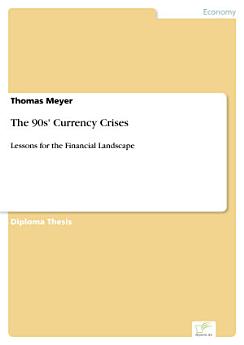The 90s' Currency Crises: Lessons for the Financial Landscape
Thomas Meyer
Jun 2000 · diplom.de
Ebook
87
Pages
family_home
Eligible
info
reportRatings and reviews aren’t verified Learn More
About this ebook
Inhaltsangabe:Abstract: When on June 2nd 1997 Thailand devalued its currency, the stage was set was the most severe and virulent currency crisis of that decade. The sudden reversal of capital flows depleted economic wealth and social cohesion in many East Asian countries, hitherto perveived to belong to the Asian Miracle. Shockwaves of the crisis were felt in most emerging markets, even those outside the region, and reached mature markets when, for instance, the hedge fund Long-Term Capital Management nearly collapsed. In face of these enormous costs, this paper analyses the possibilities and boundaries of attempts to either reduce the likeliness of respective financial shocks or, when unavoidable, lower the costs of managing these crises. On the ground of the state-of-the-art models of currency crises it is examined which domestic or international factors contributed most to the observed outcome. The guiding question is if either moral hazard considerations, in the form of governmental guarantees and alike, or approaches of multiple equilibria are more suited to serve as an explanation. Moreover, this paper illuminates the significance of the original sin hypothesis which states that emerging markets are constrained when trying to borrow abroad in domestic currency or, even when trying at home, to borrow long-term. Although it is acknowledged that all these factors are valid simultaniously, superior importance in the following parts is given on the multiple equilibria approach. The main part of the paper discusses the most influencial reform proposals of academics and institutions such as the IMF or the Group of 22. Approaches for a new financial architecture are divided into issues of the exchange-rate regime, public and private liquidity, and the institutional framework. These recommandations include questions of dollarization; an international lender of last resort; insurance agencies and credit facilities; capital controls; improved regulation and transparency; as well as the addidition of collective action clauses and alike to international bond contracts. They are assessed according to the criteria developed before, especially with regard to the approaches of moral hazard, multiple equilibria, and original sin. Taking into account that any grand scheme is rather unlikely to be realized on short notice, the conclusions concentrate on moderest reform proposals which can be pursued by emerging countries indiviually or with the assistance [...]
Rate this ebook
Tell us what you think.
Reading information
Smartphones and tablets
Install the Google Play Books app for Android and iPad/iPhone. It syncs automatically with your account and allows you to read online or offline wherever you are.
Laptops and computers
You can listen to audiobooks purchased on Google Play using your computer's web browser.
eReaders and other devices
To read on e-ink devices like Kobo eReaders, you'll need to download a file and transfer it to your device. Follow the detailed Help Center instructions to transfer the files to supported eReaders.







